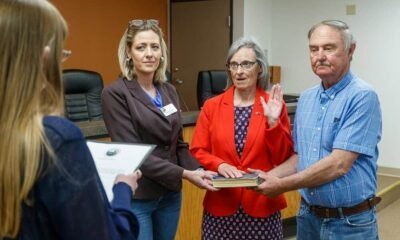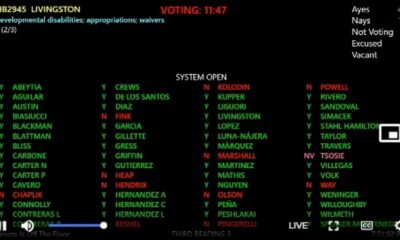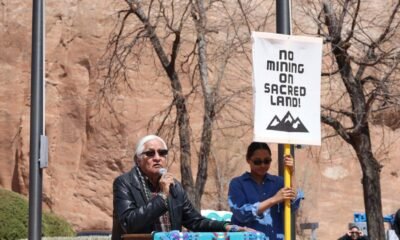arizona
Navajos Urge U.S. House to Restore Crucial Aid for Bomb Fallout and Uranium Mine Victims

WASHINGTON – Survivors of nuclear testing and uranium mining are intensifying their efforts to urge Congress to reauthorize a critical compensation program that lapsed in June. This initiative primarily affects individuals from the Navajo Nation, who are planning a rally next week at the Capitol to honor victims of radiation exposure through prayers and ceremonial performances.
Maggie Billiman, a daughter of a Navajo Code Talker from World War II, emphasized the urgency of this legislation, noting that many victims, including her family, have suffered from cancer attributed to nuclear fallout. “I want Congress to realize that it’s important and we need to pass this bill because some people did not get any … compensation,” she stated, reflecting the pain of her community.
The rally, scheduled for September 24, aims to unite voices in prayer and song to advocate for those impacted by radiation. Billiman conveyed the emotional toll of watching her community endure suffering without adequate support. “It’s hard to process all these things and to have my family be suffering and my community be suffering,” she said.
Since its inception in 1992, the Radiation Exposure Compensation Act has disbursed approximately $2.6 billion to over 41,000 individuals negatively affected by radiation. Eligible claimants, including downwinders and uranium workers, can receive between $50,000 and $100,000 for illnesses linked to radiation exposure.
The urgency of the moment is underscored by a U.S. Justice Department projection that anticipates an additional 1,070 claims could be approved by the end of September. Despite prior extensions of the program, the most recent authorization expired in June, leaving many in uncertainty.
The Senate, controlled by Democrats, passed an extension in March with a 69-30 vote, proposing a five-year filing period. However, the Republican-led House has yet to schedule a vote on the measure. Speaker Mike Johnson’s office has not responded to inquiries regarding the bill’s status, leading to frustration among advocates.
Larry King, a former uranium mine worker, criticized congressional inaction, attributing it to concerns over budget constraints. He described the situation as a grave misunderstanding among some lawmakers, asserting that the compensation program serves a broader community: “It’s for everybody. It’s to compensate former uranium workers of all walks of life. Not just Indigenous people.” King, who has personal experience with the mines, called on Speaker Johnson to facilitate discussion and a vote on the legislation.
Many Navajo individuals lived in proximity to sites where U.S. nuclear bomb tests were conducted. An estimated 3,000 to 5,000 worked in uranium mines across the region. While the current federal budget is set to expire on September 30, RECA payments will continue as they draw from a trust fund that does not require immediate replenishment, according to the Department of Justice.
Advocates plan to travel via bus from Albuquerque, New Mexico, with an anticipated turnout of more than 70 participants at the protest. Dancers from the DinéTah Navajo Dance Group will perform on the Capitol lawn, providing blessings and raising awareness for those affected by radiation exposure.
While the Navajo Nation takes a prominent role in advocating for the reauthorization of RECA, the program encompasses downwinders from several states, including Arizona, Colorado, Idaho, Montana, Nevada, New Mexico, Utah, and Guam. Of the 5,480 approved claims by the end of 2023, approximately one in seven were filed by Native Americans, predominantly Navajo, totaling over $372.6 million.
Justin Ahasteen, director of the Navajo Nation Washington Office, firmly stated, “Our people are neither expendable nor invisible,” reiterating the importance of addressing the needs of those impacted by past government actions.


















